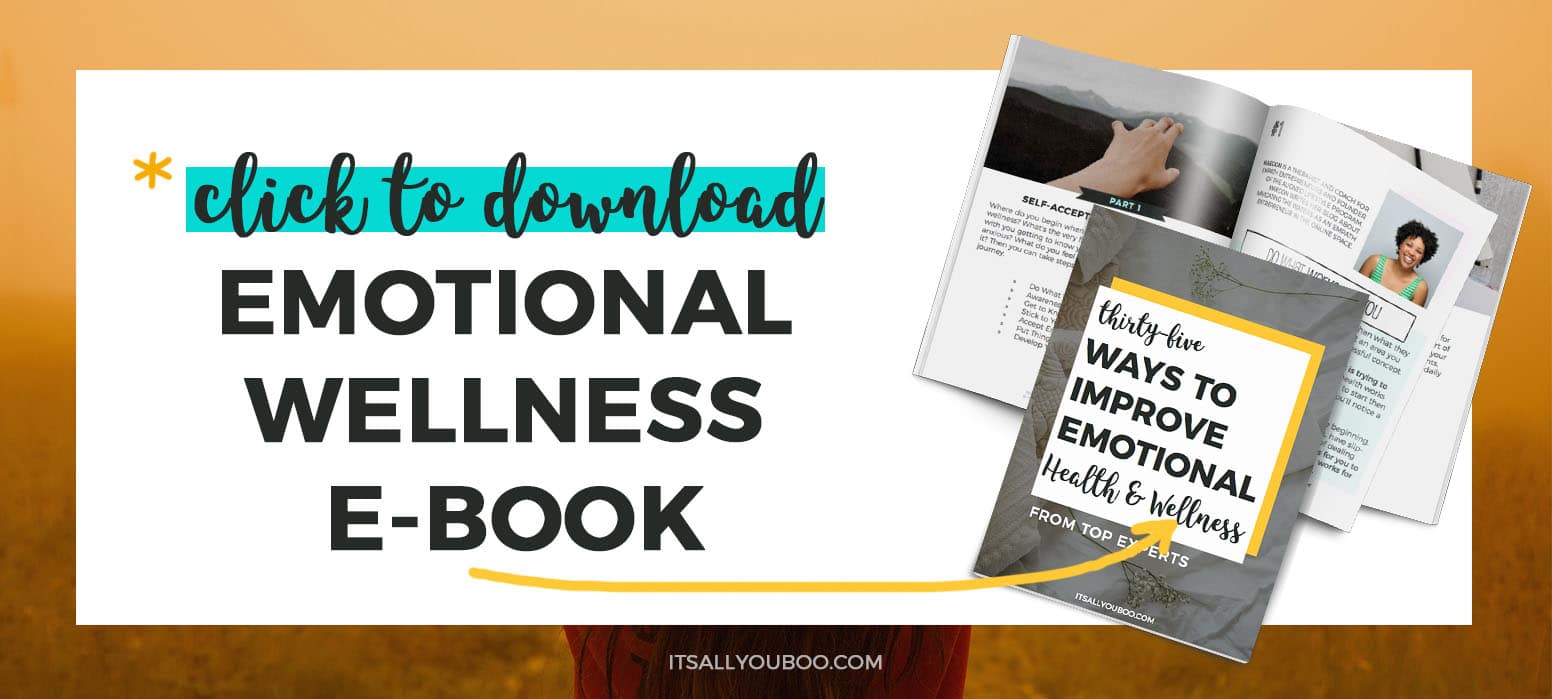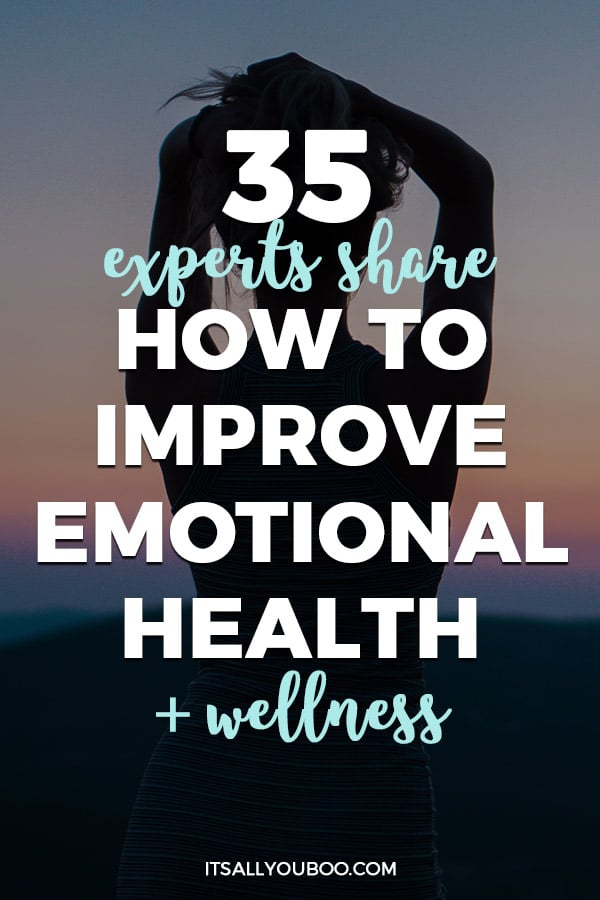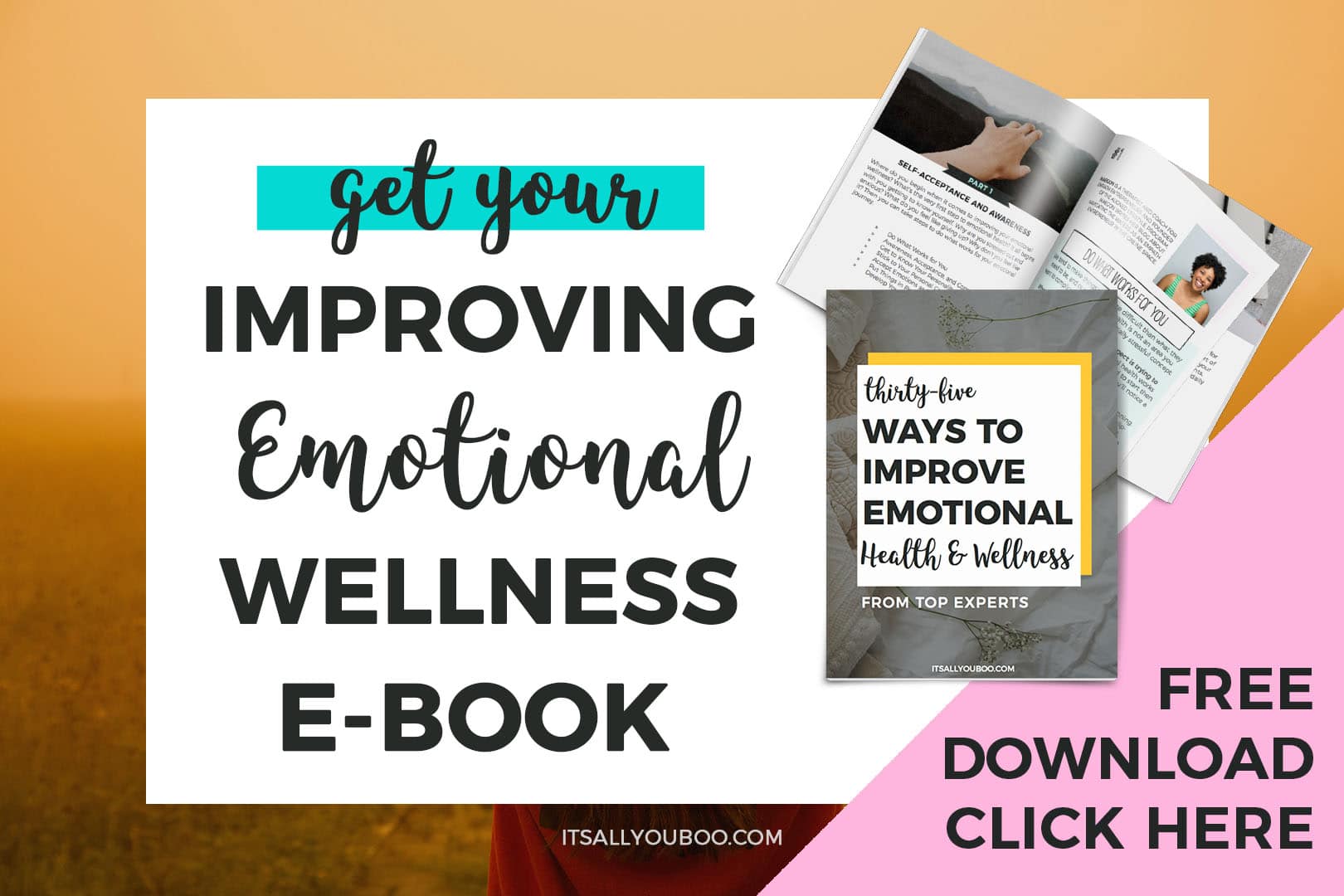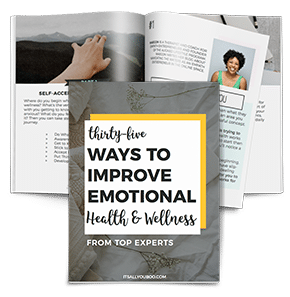What are the benefits of emotional health and wellness?
We’ve all been there at one time or another.
Life becomes “too much” and life balance goes out the window, with your sanity.
You’re stressed out, worried beyond measure, overwhelmed with life or work and maybe you’re even feeling depressed.
To say you’re just not feeling like it is an understatement. You feel like you’re falling apart.
TABLE OF CONTENTS:
How to Improve Your Emotional Wellness:
This is NOT a good place to be, because you have things to do! You’re working towards achieving your goals and dreams, but right now just getting out of bed or falling asleep at night is a challenge.
So, what do you do? How do you pull yourself back from the edge and achieve emotional wellness?
First things first, if you are consistently struggling with your emotional health, please seek out professional help. A therapist or counselor is just a Google search away. Type in “therapist near me.”
I turned to 35 emotional health and wellness experts, from therapists, psychologists, and counselors to doctors, intuitive emotional healers, and life coaches, asking just that. What is the #1 strategy for improving emotional health and wellness?
No matter where you are on the spectrum of emotional wellness, from feeling just a bit overwhelmed to feeling like a hot mess, there’s an emotional wellness tip here for you. Find what works for you! And don’t be afraid to get started and reach out for help.
Let’s get started on our journey to emotional wellness. Plus, be sure to get your FREE Emotional Wellness eBook with all 35 ways to focus on yourself.
Self-Acceptance and Awareness
Where do you begin when it comes to improving your emotional wellness? What’s the very first step to emotional health? It all begins with you getting to know yourself. Why are you stressed out and anxious? What do you feel like giving up? Why don’t you feel like it? Then you can take steps to do what works for your emotional journey.
- Do What Works for You
- Awareness, Acceptance, and Compassion
- Get to Know Your Personality
- Stick to Your Personal Core Values
- Accept Emotions as Normal, Not Wrong
- Put Things in Perspective
- Develop Your Self-Awareness Skills
#1. Do What Works for You

Maegon Renee
Therapist and Coach for Empath Entrepreneurs
Pretty simple, huh? You probably expected me to say something profound, but it isn’t. We tend to make things way more difficult than what they need to be, and our emotional health is not an area you want to complicate an already potentially stressful concept.
What I find is that the most difficult aspect is trying to find the motivation to start. I’m going to let you in on a little secret: if you wait until you feel motivated, have the energy, or are having a good day you will never begin! Our emotional health works opposite of how we might think. You will need to start then as you practice it and you establish a routine; you’ll notice a difference in how you feel.
This means you may have to force yourself in the beginning, especially if you are feeling depressed or establishing a healthier routine is foreign to you. It’s going to feel uncomfortable at first, you WILL have slip-ups and you’ll want to revert to your old ways of dealing with things. That happens to all of us, but I’m going to encourage you to keep at it. Once you find the “thing” that works for you to continue to perfect it and remember that what works for someone else may not fit your lifestyle.
👉🏽 Maegon is a therapist and coach for empath entrepreneurs and founder of The Aligned Lifestyle Program. Having spoken on numerous podcasts, panel discussions, and at events related to domestic violence and women’s rights, Maegon writes her blog about navigating the waters as an empath entrepreneur in the online space.
#2. Awareness, Acceptance, and Compassion

Tatiana Garcia
Licensed Professional Counselor, Brighter Path Counseling
One of the most important techniques to start improving your emotional wellness is to become more aware. You cannot start to change unless you already have an awareness of what you want to change and how you might be getting in your own way.
A few tips to increase awareness include keeping track of your mood, journaling your thoughts, and meditating.
Often our challenges stem from the judgments we make about ourselves and the people around us. Practicing acceptance is a way of accepting the past, accepting yourself, and not trying to change other people or things you have no control over. Much suffering comes from resisting the present moment and what you don’t have control over.
Improving emotional wellness can be a journey of many ups and downs. Be compassionate towards yourself. You are doing the hard work of change and it’s not always easy. Even small changes are progress and should be noticed! The only way you will continue to improve is if you celebrate your successes, not by criticizing your shortcomings.
👉🏽 Tatiana specializes in helping people cope with stress and anxiety through mindfulness, increased self-awareness, and positive psychology. She is truly passionate about the process of growth and self-improvement and helping people create fulfillment in their lives. Tatiana shares 10 Ways Gratitude Improves Your Happiness.
#3. Get to Know Your Personality

Marta Spirk
Success Coach
Finding ways to get to know yourself, get back to your true essence and identity, is what helps to define and create your happiness and emotional wellbeing.
My #1 recommendation when I start working with a new client is having them take the Enneagram test – a personality test that is by far the most accurate (and free online).
What I love so much about this test is that it points to your strengths and weaknesses and allows you to understand why you have certain emotional patterns and reactions in your relationships and life in general.
I also recommend people have their closest friends/family members and spouses take the test so they can see how usually the people they surround themselves with have a similar personality type – most often the one that complements their personality and its weaknesses.
👉🏽 Marta Spirk is a success coach who’s programs are specifically designed to help you find clarity on what’s holding you back, what your passion is and give you steps to live a more fulfilling life and create a PROFITABLE BUSINESS.
#4. Stick to Your Personal Core Values

Natalie Stoner, M.Ed., CLC
Certified Life Coach
One of the best ways to maintain emotional balance and wellness in your life is to define and adhere to a set of personal core values. These are conceptual, practical, foundational, and aspirational principles that guide conduct.
They also give you a clear framework for navigating tricky situations and setting appropriate boundaries in relationships. They’re a reminder of what is meaningful to you, even in challenging situations. It sounds simple, but many people never define what’s most meaningful and end up taking on responsibilities, relationships, and positions that don’t align with their values.
To figure out what your core values are, consider what matters most to you, the principles that guide your actions when you are feeling your best. Your core personal values are an overview of your highest and purest aspirations, things you want to manifest in your life. They can include values you already embody, as well as ones you admire and want to incorporate over time. If you are about to take on a new project or relationship, you can measure it against your values to see if it’s a match. If not, let it go and wait for something that’s right for you.
👉🏽 Natalie Stoner is a Certified Life Coach, Reiki Master, writer, and creative entrepreneur who studied Educational Psychology and English Literature in Detroit. She brings all of her passions together in Bloom Where You Are Academy, an online learning and resource hub providing tools for self-development aimed at the spiritually curious and growth-minded. Natalie helps you audit your beliefs.
#5. Accept Emotions as Normal, Not Wrong

Jenna Hillier
Emotional Intelligence Coach
Emotional health starts by accepting your emotions. It’s a scientific fact that we are genetically wired with primal instincts, meaning it’s totally normal for your body to have a reaction to an experience. Think about your emotion as your bodies natural reaction to an event or experience and trust that your body knows what it’s doing.
Accepting all emotions as OK and trusting that your body is wise, wise enough to process an emotional experience as it occurs, will lessen the urge you feel avoid or escape the emotion through self-sabotaging acts like emotional eating or co-dependent relationships. To help with acceptance, begin to expect that you are going to have a natural reaction to life events and experiences in the form of emotions. When you can normalize and accept your emotions without making yourself wrong for having them, you know you’re on the way to greater emotional health.
👉🏽 Jenna Hillier guides sensitive souls to embody their highest self in life and in business instead of letting fear stop them (again and again) from taking actions towards the life they dream of.
#6. Put Things in Perspective

Kimberly Clay
What She Say
No matter who you are, what is your circumstance or situation, one simple thing that can immensely help your state of mind, emotional health and wellness is the ability to put and keep things in your life in their proper perspective.
Proper perspective allows you the ability to consider any situation, problem, or challenge critically and objectively to find your best solution.
When you know and understand a genuine threat, or the actual intensity or gravity of a situation or potential problem, you can work to find the solution that matches the level of your challenge. You avoid expending too much or too little of your energy and resources to resolve your issue.
Having a proper perspective also helps you to avoid overwhelm or becoming stuck. Sometimes when we’re faced with problems or unexpected situations arise they can seem too big for us to deal with. By placing things in perspective, we are able to see challenges for what they are and realize that we are not powerless against them. We have resources and can formulate a plan of action to find our solution.
This helps us to remain calm, better control our response and keep our balance emotionally.
👉🏽 Kimberly Clay has studied self-improvement and personal development for 20+ years and founded a lifestyle blog for women focused on self-improvement that offers practical help and information for women working to live their best lives. Kimberly shares How to Relieve Stress and Anxiety.
#7. Develop Your Self-Awareness Skills

Laura-Lee
Holistic Health Practitioner
There are clearly many, many ways you can practice self-care and set boundaries in your life to improve your emotional wellbeing. However, the fundamental necessity to employ *any* of these strategies is a very certain *kind* of self-awareness.
It’s imperative, especially in times of stress, that you begin to examine the difference between ‘you’ (your conscious mind) and the ‘reactions’ that happen within you. Emotional, energetic or compulsive reactions can sometimes feel like they are in fact ‘you’, and ‘you’ therefore have no control or ‘you’ must act on them to be authentic or worse — ‘you’ are somehow deficient because ‘you’ feel these ways. YOU are not your involuntary reactions. YOU are an objective and reasonable person who can mediate emotional responses to YOUR benefit.
Make a mental note right now to stop and examine your thoughts anytime emotional responses become intense. It’s important to make this decision when you are rational (so you can remember when things get intense and cloud your mind). Create a mindfulness practice to bring you back into the present and get back to being objective. I really love daily journaling, but what will work for you is very personal.
👉🏽 Laura-Lee is a Holistic Health Practitioner curating educational, entertaining and therapeutic content to help you live your healthiest and most fulfilling life. She shares 5 Practical Tips to use Awareness to Get to Your Health Goals.
Daily Journaling and Meditation
Now that you’ve started to explore your inner person, it’s time for some strategies for improving emotional wellness. At the heart of these practices in mindfulness – being present and aware of your thoughts. It’s no surprise that to get in tune with your thoughts, many emotional health experts recommend starting with a daily journaling and meditation practice.
- Create a Daily Mindfulness Practice
- Increase Awareness of Your Thoughts
- Practice Simple Brain-Training
- Start a Meditation Practice
- Meditate for 20 Minutes Every Day
- Journal Therapy for Your Thoughts
- Just Journal for 10 Minutes a Day
#8. Develop a Daily Mindfulness Practice

Dr. Tricia Wolanin, Psy.D.
Clinical Psychologist, Author, Yoga Instructor
One of the biggest wellness tips I can offer is developing a daily meditation/mindfulness practice.
Upon waking it is one way that we can start our day with intentionality and discipline before the rest of the day unfolds.
It brings us to center and reminds us of a base we can turn to, throughout what will follow. We cannot be in charge of the traffic that will meet us, requests to be made, or other stressors that may arise but we can control the start of the day.
👉🏽 Dr. Tricia Wolanin is a psychologist who has a great understanding of the universality of depression, anxiety, and pain. Check out her book, The Fragrance of Wanderlust: How to Capture the Essence of Travel in Our Everyday Lives.
#9. Increase Awareness of Your Thoughts

Alexander G. Marieb
Founder & Trip-Sitter at Mindful Excursions LLC
My #1 tip for improving emotional health and wellness: Practice a form of meditation that increases awareness of and makes one more conscious of their thoughts.
Your attention is constantly being roped around in every which way by the fast-paced, symbolic, and deadline-driven nature of our society, we fail to be in tune with our inner life. When distracted in this fashion, we fail to see the root of our emotional turmoil or neuroticism. Building the ability to pay attention to the thoughts and sensations that arise within your consciousness allows you to view them objectively from a distance as opposed to being controlled by them.
When we are unaware of our thoughts, they are dangerous; We are unable to see their counterproductive and sometimes insane nature, but when we create enough space between ourselves and them through a regular meditation practice, we are able to cut the soon to be runaway train of the mind carrying anger, anxiety, or desolation off from its energy source before it’s too late.
👉🏽 Mindful Excursions is a startup that creates opportunities for psychedelic practitioners of all types to refine their healing and or transformational craft in an immersive, community-oriented, and direct-experience based way.
#10. Do Simple Brain-Training Exercises

Jennifer Sutton, Wellness Expert
Founder, Quantum Shift What If Cards and the Results-Oriented Inquiry Process
I recommend a simple brain training process that helps in all areas of your life called the Results-Oriented Inquiry process. You ask new questions and just be still with those questions and let the brain do the work of seeking the answers.
A simplified example is to ask, What if I feel better now? What would my life look like without this stress? Simply ask the questions, take a deep breath, smile, and access the feeling that you would have if these things were already true for you.
I recommend doing this for at least one minute and, ideally, you would continue for three to five minutes at least once a day. These types of questions – what if… and what would my life look like if… – redirect the brain to start looking for clues, facts, etc. that prove this new idea. Your “automatic” brain starts to filter information differently – instead of proving the old pattern (I feel bad, I’m depressed, I’m lonely, etc.), it seeks new data to prove the new idea. Because it’s a question, not a statement, your brain does not reject it outright, instead, it becomes curious and seeks new input for you.
👉🏽 Jennifer Sutton, M.B.A., is a Certified Infinite Possibilities Trainer, Transformational Journeys Guide, Founder of Trust Life seminars, business owner, and Shoshin Ryu martial arts teacher whose mission is to help people clear fear and pain so they can find and live in their joy on a consistent, daily basis. Jennifer supports individuals and groups using EFT tapping, brain training, and laughter to release physical and emotional pain and self-judgment allowing them to move toward a place of peace and self-confidence. Get your Quantum Shift What If Cards here.
#11. Start a Meditation Practice

Wade Brille
Certified Professional Life Coach
If I could suggest only one tip to support someone’s emotional wellbeing, it would be to start a meditation practice. Meditation for me personally, has been the best medicine I could gift myself when I was diagnosed with cancer while at the same time lost my mother to her battle of cancer. Having a meditation practice supported me standing grounded admit the chaos. I was able to manage my anxiety and heal my emotional and physical body.
Even though the science of mindfulness meditation is still developing, there is research that supports the findings for emotional wellbeing.
A Harvard study in 2011 took a diverse sample size of over 2,000 participants and by using their iPhones texted them at random times of the day asking: How happy are you? What are you doing? Is your current thought pleasant, unpleasant or neutral? This study highlights that people’s minds tend to wander about 46.9% of the time and when our minds wander we are more unhappy.
When we are mindful (even with events we can’t stand… like washing dishes) we are proven to be happier! Practicing training our wandering mind during meditation to stay present supports us feeling happier and more content with life. This gives us a really powerful tool on how to manage the constant ups and downs of life.
👉🏽 Wade Brill is a certified professional Life Coach as well as a UCLA Mindfulness Certified Facilitator. She specializes in working with busy professionals to help them prioritize themselves so that they prevent burnout and sickness and have more energy to give back to themselves and the world. Wade shares What does Mindfulness Mean?
#12. Meditate for 20 Minutes Every Day

Morgan Balavage
Yoga teacher, wellness coach, and intuitive healer
I am a yoga teacher and meditation coach, and I literally give people only one piece of advice: meditate. 20 minutes. Every day.
Neurologically, giving your mind that hard reset to allow all thoughts to be thunk gives you space to be present when you go about your business. Here’s an example: say someone cuts you off in traffic, and it brings up some anger: how dare they think their time and space is more important than mine? You bring that energy into your next interaction, say with your partner, and they say something that triggers an old argument from the past. A few terse words later, and suddenly, you’re in a fight.
If you’d practiced being present earlier that day, perhaps things would have gone differently. Perhaps when someone cut you off, you would have come at it from a place of compassion: That person is in a hurry. Maybe their wife is in labor in the back seat. Maybe they’re late to pick up their grandmother from the airport. I’ve been late before. It’s stressful. I hope everything ends with peace for that person.
You would bring that compassionate energy into your relationship, so when your partner says something that triggers you, you can respond instead of reacting: Hey honey, that was a bit sensitive for me. Next time, could you speak more kindly to me?
So how to meditate?
- I like a simple mantra: Sit comfortably.
- Set a timer and set it out of reaching/viewing distance (Insight Timer is a great app).
- Close your eyes. Breathe in and think, I am. Breathe out and think, Focused.
- Or you can insert whatever word, whatever energy you need.
That’s it. For 20 minutes. Be in peace.
👉🏽 Morgan Balavage (E-RYT 500) is a yoga teacher, wellness coach, and intuitive healer trained in a variety of healing modalities, including Thai Massage, Yoga, guided meditation, and chakra alignment. Connect with Morgan at Splendid Yoga.
#13. Journal Therapy for Your Thoughts

Jas Rawlinson
Mental Health Advocate
“Toxic workplaces. Annoying customers. Misunderstandings with your partner… Every day we’re hit with a myriad of stressful circumstances, and sometimes, swinging by the bottle shop or opening up a packet of cigarettes can feel like an easy ‘quick fix.’
But if you’re looking for a healthier alternative to clearing the mind, reaching for a pen and notebook can work just as well. In fact, journal therapy (or ‘brain dumping’ as I like to call it) is often recommended by psychologists as a natural stress reliever and healing catalyst — and it’s something I myself have leaned on over the years.
From reduced anxiety and insomnia to a clearer focus of what you’ve achieved each week (no matter how small) and what you’d like to improve in, journal therapy can make a significant difference to your emotional wellbeing.
👉🏽Jas Rawlinson is an Australian mental health advocate, wellness writing coach, and author with a passion for empowering survivors of trauma through the power of writing.
#14. Just Journal for 10 Minutes a Day

Andrea Travillian
Lifestyle Transformation Coach
My number one tip for improving your emotional wellness is to journal. Not a journal in the sense that you are tracking goals, or what you did that day. But where you are digging into why you are sad, depressed or stressed.
The great part of journaling for emotional health is that you can cover any area of your life that needs improvement. Journal about work, your relationships and more.
I recommend that the best way to get started is to write out what triggered the feeling you are dealing with. Then begin to ask yourself questions about the situation. Examples could be: why did it make me feel this way, what lesson do I need to learn about this, am I experiencing this problem in other areas of my life and am I trying to control something that is not mine to control.
Daily journaling can take time to learn, so don’t give up after one time. Commit to 10 minutes a day and you will begin to see progress in your emotional well-being!
👉🏽 Andrea Travillian is a lifestyle transformation coach helping women rediscover themselves and reclaim excitement for their lives. She’s been featured on Girl Boss, Brit & Co and Bustle.
Surround Yourself with Positivity
Tired of feeling negative all the time? Like your thoughts are always focused on the dark side? It’s time to wrap yourself in positivity. We’d love to be happy and positive in the face of challenges and daily life, but how do we get started? To improve your emotional health and wellness, here are some simple strategies to help us stay positive no matter what.
- Speak Positive Statements
- Read Positive Insight Cards
- Think Like a Winner
- Become an Optimist
- Perform Random Acts of Kindness
- Become a Love Generator
#15. Speak Positive Statements

Damon Nailer
Life Coach
The mind is so remarkable that it can be improved, configured, and reconfigured throughout our lives. One of the most instrumental techniques for reshaping it is meditation.
We should create a list of scriptures, positive sayings, and uplifting quotes that we can speak within ourselves in the morning, throughout the day, and before we retire at night. This ensures that we have positive thoughts and energy when we start the day off, during the day, and even while we are asleep.
What makes meditation so important/effective? Words. Words contain transformative power that affects our thoughts, emotions, and actions. As we think and ponder on wholesome words, they will cause us to feel better. When we feel better, we typically display a more pleasant attitude and exhibit good behavior. Conversely, if we think and ponder on negative statements, they will cause us to feel bad/down. When we feel bad/down, we typically have low energy, an unpleasant disposition, and we act out in distasteful ways.
👉🏽Damon Nailer is a consultant (life coach), parent educator, motivational speaker, and author. It is his mission to provide direction, inspiration, and education concerning our daily lives by delivering dynamic speeches, inspirational writings, educational content, uplifting music, and electrifying performances.
#16. Read Positive Insight Cards

Dr. Murad, M.D., FAAD
The Father of Modern Wellness
I believe in the power of positive psychology. Positive self-talk generates positive emotions. And positive emotions reduce stress and result in profound effects on our overall wellbeing and physical health. Reading positive insight cards like these ones (but any kind of positive affirmation cards will suffice) twice a day has been proven to lower heart rates and stress levels!
We also saw lower blood pressure and higher levels of skin hydration (a major factor in a youthful complexion and overall wellness). Positive insight cards encourage gratitude, optimism, and resilience. They elicit positive feelings in readers, without specifying what those feelings should be; in other words, to let readers generate their own positive response.
👉🏽 Dr. Howard Murad, M.D., FAAD, The Father of Modern Wellness and founder of the Murad, Inc. skincare collection. Dr. Murad is also the author of several books, including a Surviving Cultural Stress Series and a Health and Happiness Series. Learn more about how to How to Talk to Yourself.
#17. Think Like a Winner

Tiffany Toombs
Wellness Expert, Blue Lotus Mind Coaching & Training
Our brains are wired to win. This means that whatever we hold to be true, we will create more of in our reality. It’s important to understand that while we have thoughts, we are not defined by or identified by our thoughts. People often assume that because the brain runs the body, that when a thought pops into our mind, it must be true. Our thoughts (and internal voice) are highly influenced by those around us, however, and based on belief systems that are predominantly created between the ages of 0-7.
The thoughts that we choose to identify with or hold onto (ie. “I’m not good enough”) will expand until all that we are able to see in our environment and life is proof that this belief is true. It’s important to know that we will filter out any beliefs that would prove our beliefs wrong.
When we choose different thoughts to identify with, especially more positive ones, our reality (and emotional state) changes rapidly.
👉🏽 Tiffany Toombs is a Wellness Expert at Blue Lotus Mind Coaching that specializes in helping her clients let go of past emotional baggage to have a healthier more positive life.
#18. Become An Optimist

Yocheved Golani
Content provider and editor, e-Counseling
Optimism is a life and sanity-saver. Optimists experience 145 fewer days of stress each year than pessimists, according to the latest research. They respond to stress in productive ways. The rest of us can learn to do so by pretending to be optimistic until it becomes our automatic response to challenges. Behavior shapes our thinking, literally imprinting our brains with messages and the types of responses that we’ll make in the future. Upbeat thinking improves our minds and lives over time.
Optimists expect and plan for positive outcomes by facing unpleasant realities as they are, not as they wish they’d be. They choose productive mindsets and behaviors/actions, eliminating problems one by one rather than surrendering to feeling overwhelmed.
Optimists focus on progress. Grateful for what works in their favor, they reflect on their decision-making process and those problems ended because of it. When glitches happen, optimists understand the need to rest, to reconsider the variables of given problems, and to think outside boxes. Optimists have a What if… sense of curiosity and playfulness. They practice What if scenarios in their minds and with role-playing activities, identifying solutions in vicarious, safe circumstance. They succeed at overcoming obstacles that way.
👉🏽 Yocheved Golani is an author and journalist plus a life coach certified in counseling skills. She helps people learn to say Yes to can-do solutions for improving their mental and physical health. Yocheved shares The Benefits of Smiling.
#19. Perform a Random Act of Kindness

Brigitte Granger
Founder/CEO of Supporti
Do something kind and unexpected for another person. When you volunteer, donate to charity, or do something nice for someone, your body releases endorphins that you make you feel great. Have you felt that warm glow after doing something nice for someone? This is known as the “helper’s high.” Giving back activates the same part of the brain that’s activated in response to food or pleasure.
It also releases oxytocin, the “bonding” hormone that’s present when we connect with other human beings. Studies have shown that altruistic actions can lower your blood pressure and stress. When you give back, you feel good about yourself, which improves your self-esteem and confidence. Helping others allows you to take your mind off your anxieties and instead, focus on the world and human connections around you. Send someone a handwritten letter just because, buy a stranger a coffee, or give up your seat on the train to someone. You’ll be doing them – and yourself – a favor.
👉🏽 Brigitte Granger is the Founder/CEO of Supporti, the accountability partner app that helps people stay motivated to achieve their goals. She has a master’s from Harvard, where she studied public health and human behavior. Become accountable with Supporti.
#20. Become a Love Generator

Benson Simmonds
Energy Healer
Become a Love Generator instead of being a love seeker. We were all brought up seeking love from an outside source. This simple tip helps you start generating your own love INSTANTLY, without relying on anyone else.
TIP #1 – Ask yourself the following question: WHAT ARE 15 THINGS I LOVE MYSELF?
Answer out loud in the following format. I LOVE MY …….(fill in the quality about yourself that you love about yourself) i.e. I love my sense of humor. I love my kindness, I love my generosity, etc.
By doing this through this question, you are generating love for yourself without waiting for it to come from an outside source.
👉🏽 Benson Simmonds is an energy healer practicing an ancient form of Jewish energy healing similar to Reiki. He is also intuitive and gets spiritual messages which he shares with clients to help them heal and restore joy and abundance to their lives. Benson is the author of Soular Power – Unlocking the Eight Gates to Joy and Abundance.
Take Better Care of Yourself
Are you burnt out and so overwhelmed? Do you feel like you’re falling apart? When we’re feeling buried under too much responsibility (both personal and professional) we understandably get super stressed. But, what if we could take better care of ourselves? Here are ways to improve your emotional health and wellness, that go well belong your typical self-care ideas and advice.
- Take “Me” Time Every Single Day
- Slow Down and Be More Present
- Know What Makes You Feel Recharged
- Enjoy Short Frequent Staycations
- Create a “Do Not Do” List
- Set Boundaries by Saying No!
#21. Take “Me Time” Every Single Day

Conni Ponturo
Author and Pilates Instructor
Here is my one tip for emotional wellness, take time every day to take care of your body and mind. It is the small steps that we do day in and day out that make a big difference.
So what does that mean? It means slow down life is not a race. Notice where you are, who is around you, what are they doing and saying? Be present. Don’t think about what’s going on later in the day, or what shopping you need to do.
Take a deep breath in and slowly exhale and allow yourself to be in the moment. How will you take care of your body? Go out into nature. Nature connects us to our deeper selves. Walk. Meet friends and walk. Take a class. Explore something that you have never done. Push out of the box you keep yourself in.
👉🏽 Conni Ponturo has been a Pilates teacher for 20 years and she gets her clients to live pain-free and to love their lives. Breath and move. She’s also the author of Falling into Joy, which shares small steps we can take daily to transform our lives.
#22. Slow Down and Be More Present

Sarah Neustadter Ph.D.
A licensed clinical and spiritual psychologist
Here are some small, common daily habits that can have a positive impact on emotional wellness and health.
#1. Walking out of the house with your hands-free and at a relaxed pace sets the tone for your commute, your day, and the tasks at hand. Running out the door with your hands full— with keys, coffee cup, books, bags, and other items is a hurried and stressful way to leave the house, and can have a domino effect, causing you to feel rushed, disorganized, and frazzled throughout your day. Make sure you take the time to put your items in your bags, minimize the clutter in your hands, or even make two trips to your car.
2. Write/type more slowly—The pace at which we type emails, scribble handwritten notes, write checks, or sign for things can affect our nervous system and sense of well-being. If we write as if we’re in a hurry, we’ll feel rushed and stressed when there really is no reason to do this. Writing faster does not get us anywhere faster. Slow your writing down, breathe, and be present.
Why might you want to pay attention to even these seemingly insignificant habits? Can they add up and have a negative impact on you?
All the small, seemingly insignificant or mindless tasks throughout the day have an effect on and can take a toll on our nervous system—namely whether we’re in a parasympathetic or sympathetic response, a flight, fight, or freeze response; the speed of our heart rate; or shallowness and comfort of breathing. This, in turn, affects our sense of stress or our sense of calm and presence.
our nervous system is overly stimulated due to rushing, for example, we may not be breathing sufficiently, receiving enough oxygen, or have enough energy to fully and efficiently attend to work, family, driving, or the task at hand. Over time, this can negatively impact the quality and functioning of our lives and relationships or worse, cause health conditions or an unnecessary accident due to neglect, stress, or absentmindedness.
👉🏽 Sarah Neustadter Ph.D. is a licensed clinical and spiritual psychologist who specializes in spiritual growth, suicide survivor grief, suicide prevention, grief, loss, existential heartbreak, and millennial issues. Dr. Sarah also has an upcoming book, Love You Like the Sky, of her own experiences with grief and getting through it.
#23. Know What Makes You Feel Recharged

Stephanie Korpal, M.Ed., LPC
Marble Wellness
I have a contribution that might be different from “getting good sleep” and “getting enough water.”
A tip I find really helpful for clients that isn’t the typical (though very important) bullet point on emotional health and well-being is to understand your extroverted versus introverted nature really well.
So often, people think that particular quality is about how much you enjoy being in the company of others, so they confused about being outgoing, yet also wanting to be at home. Extraversion and Introversion are really about what makes you feel recharged! If at the end of a long work week, the thought of going to a happy hour sounds like the worst idea ever, you’re likely introverted. On the other hand, if being in a crowded office all week makes you crave the socialization and decompression of a happy hour, you’re likely extroverted.
Once you know this about yourself, you can plan social events accordingly. For extroverts: have some social commitments on your calendar when you know you have a big deadline or have been feeling “off.” For introverts: be careful about committing to too many social events in a row, especially if you interact with people a lot at work, so you don’t burn out and feel over-extended.
👉🏽 Stephanie Korpal is a mental health therapist with her own private practice in St. Louis, MO. She’s worked with individuals for 11 years old, those in their 60s, and all the ages in between. Self-care and good mental hygiene are really important in all aspects of her work with clients. She shares 4 Quick Tips to Manage Low-Grade Anxiety.
#24. Enjoy Short Frequent Staycations

Samantha Morrison
Health and Wellness Expert for Glacier Wellness
Stress is one of the most devastating consequences of living in our modern world. The tricky part of it all is that finding effective methods of curbing stress can be few and far between. Simplicity is almost always a good thing, especially when it comes to stress management.
One of the most effective ways to blast through your stress is through short frequent staycations. These simple getaways are a great way to break out of the hectic hustle and bustle of your regular workweek.
It’s far too easy to experience burnout in today’s fast-paced society. Part of surrendering to burnout is letting the overwhelm of work and life take over your 24/7. In the end, you are far more likely to succeed if you take the necessary steps and time to breathe, integrate your experiences, plan ahead, and start fresh when you’re ready.
I recommend taking your significant other or best friend, leave work early on Friday, and spend the entire weekend together as if you were on full-fledged vacation. Whether you want to be spontaneous or plan ahead, be sure to explore, go out on dates, check out local scenes, and stay in a hotel. It’s a small idea with a huge impact that can help you thrive both at home and at work.
👉🏽 Samantha Morrison is a Health and Wellness expert for Glacier Wellness, a company dedicated to natural and sustainable health products. Start your wellness journey with Glacier Wellness.
#25. Create a “Do Not Do” List

Julia Egan, PhD
Author, Speaker, Founder of Balancing Bravely
We are overwhelmed because we have so much to do, and we have so much to do because we are trying to do it all. People love to advocate for “to do” lists, but when you are stressed out, but it can be hard to even start the list and if you successfully write everything down, you will likely realize that you feel overwhelmed because your current “to do” list is unachievable, unsustainable, and is not setting you up for success.
That’s when you create a “Do Not Do” list.
Step back and really look at what’s on your “to do” list. Ask yourself these questions:
- What could be postponed?
- And, what can be delegated to other people (kids, spouses, family members, colleagues, friends)?
- What can be moved to your “Do Not Do” list?
I get overwhelmed fairly frequently since I run my own healthcare consulting company, have a passion project, Balancing Bravely about inspiring women to improve their work-life balance, and have 2 young kids. In those moments of emotional chaos, I make a “Do Not Do” list and the impact is immediate, profound, and transformative. What if you could reduce your workload and stress in minutes?
👉🏽 Julia Egan has a Ph.D. in Human Development from Penn State, and her day job is about implementing behavioral interventions in healthcare. She is passionate about understanding and improving work-life balance. She shares tips for improving emotional wellness and overcoming overwhelm.
#26. Set Boundaries by Saying No!

Dr. Charmain Jackman, Licensed Psychologist
Mental Health Expert
Today’s workplace demands for high productivity and high competition; the need to be always “on” created by technology; and the “opportunity” to work from home—can blur the lines between home and work leading to workplace stress and burnout and making the idea of a healthy work-life balance seem impossible!
Harnessing your power to say NO allows you to create healthy boundaries between work and home, which can significantly improve your emotional well-being. So, how do you say NO while maintaining positive relationships with your boss and co-workers?
- Consider whether new “opportunities” align with your purpose and vision.
- Ask questions about the actual time commitment involved if you say yes.
- Prepare for the push-back from your boss, co-workers, or family when you set a boundary—it is inevitable!
- Practice saying no in low-risk situations.
- Schedule social activities into your calendar every week!
👉🏽 Dr. Charmain Jackman is a licensed psychologist and emotional wellness expert in the Boston area. Dr. Jackman is available to meet one-on-one to create strategies to launch or grow your mental health business. Connect with her at InnoPsych Private Practice Consultations.

Deep Breathing and Exercise
Inhale, hold it and slowly exhale. That’s how we calm ourselves down and stay centered to face the challenges of the day. Our emotional health and wellness are closely tied to our health and fitness, movement and deep breathing provide some of the best coping strategies. Here are a few more ways you can improve your emotional wellness:
- Just Stop and Do Squats
- Do Daily Breathing Exercises
- Start Exercising Regularly
- Breathe Deeply
- Spend Time in Green Spaces
- Proper Tongue Placement
#27. Just Stop and Do Squats

Cali Estes, Ph.D
Celebrity Addiction Specialist and Founder of The Addictions Coach
My number one go-to tip for dealing with stress, anxiety, or general feelings of being overwhelmed is to DO SQUATS. Yes, squats. Exercise boosts serotonin and dopamine (the happy chemicals) and will instantly make you feel better. Squats are free, require zero equipment to lug around and can be done anywhere. Sure there are oils and apps you can buy and carry around, but something as simple as stopping and doing 25 quick squats while breathing will make you instantly feel better.
Exercise helps reduce stress and by breathing as you squat, you are getting extra oxygen and lessening your anxiety (panic attacks come from lack of oxygen). You can be in line at Target and If you suddenly feel overwhelmed with any emotion, including sadness or anger, 25 squats will melt it away fast. The release of the chemicals in your brain (your body’s own natural juice) will instantly make you feel better and we all want to feel better! So next time you experience any overwhelming emotion (except joy) stop and squat.
👉🏽Cali Estes, Ph.D is an author and highly sought after Addiction Therapist and Life/Corporate Coach who specializes in harm reduction and utilizes holistic approaches to treat addiction, as well as mental conditions holding her clients back from reaching their full potential. She works with individuals, drug, and alcohol treatment teams and addiction professionals looking to advance their knowledge base. Connect with her at Addiction Coaches.
#28. Do Daily Breathing Exercises

Kristen Peterson, MPH, RDN, LDN
PrimeLife Nutrition, LLC
Tips to improve emotional wellness and health: Breathing – We often underestimate how helpful breathing can be to chill us out. It can slow our heart rate down, relax our muscles and ease tension.
If you can control your breathing and practice breathing exercises EVERY DAY, you will be in control of how anxious, stressed, and negative you could get. Increasing oxygen in the blood with deep, focused breathing will allow your organs and muscles to get the oxygen they need to help you relax and think about the scenario before reacting to it.
We live in a world where we react instead of respond. Knowing how to respond to something can prevent us from over-exaggerating a situation, freaking out about it and causing unnecessary stress to ourselves and others. If you stop, think about how you should respond (as opposed to reacting), you’ll be in control of your emotions, feelings, and ultimately stress. We are responsible for our own stress, and breathing is the exercise that can help you understand that the big things start to feel more small and insignificant, and they’re just not worth getting worked up over.
👉🏽Kristen grew up very picky as a kid, and was never great about trying new foods. Fast forward about 20 years later and she’s passionate about food and the relationship it has with our bodies. She takes the guesswork out of how to eat better and makes it easier for you to envelop it into your everyday life.
#29. Start Exercising Regularly

Katrina
Online Fitness Coach
It might be the last thing you want to do, but committing to regular exercise will help calm those all-consuming feelings of anxiety, stress, and depression. Regular exercise is very beneficial for improving an individual’s emotional wellbeing because it releases endorphins within the brain that promote feelings of wellness.
Individuals often turn to medication to resolve feelings of anxiety and depression, without a true certainty of whether the tablets will work, or actually cause more harm than good. Medication should always be the last resort.
Scientists have proven over and over that exercise is a miracle cure. Not only for your physical health, but more importantly for your mental health, and emotional wellbeing. Regular exercise is a great way to treat moderate levels of depression. And, the best part of all is that exercise is FREE, achievable to the majority, and does not have any potential negative side effects that medication can have. Regular exercise is a great tool for anxiety sufferers because it acts as a calming force, in a world of chaos.
👉🏽 Katrina is an online fitness coach. Her mission is to empower every woman worldwide to live a fit, healthy life. Body positivity is key to a healthy mindset. Connect with her at KGS Health and Fitness.
#30. Breathe Deeply for 20 Minutes Daily

Ciara Jean Roberts
Naturopathic Nutritional Therapist, Yoga Teacher & Writer
Breath is the pillar of the yoga practice and this is why the benefits of yoga are so profound. For many of my clients, stress, anxiety and various forms of addictive patterns are commonplace. The breath brings us back home and away from being so interested in chaotic thought patterns.
Coherent breath is a breathing technique where you simply breathe in through the nose, smoothly and effortlessly, for the count of 6 seconds, and then breathe out through the nose for the same length of 6 seconds. This stimulates both aspects of the nervous system evenly – so the inhale activates sympathetic nervous system to aid focus, action, and drive, the exhale stimulates the parasympathetic nervous system, the more that facilitates restfulness and surrender.
By breathing deep into the belly (of course one can build up to 6 seconds if it’s too much at first), the key breathing muscle, the diaphragm, moves and this influences the body/mind system hugely. This technique, when practiced for 20 minutes daily, will recalibrate your entire wellbeing. You can also draw upon it in shorter amounts when you begin to feel the rise of overwhelm or tension. It’s all about providing your body and mind with the message of safety.
👉🏽Ciara Jean Roberts is an experienced yoga teacher and nutritionist who also writes for various publications across media (Mail on Sunday, Elephant Journal, Yoga Magazine etc.). Her client base is doctors and lawyers and this breath has been tremendously helpful in very difficult and challenging circumstances. Connect with Ciara at Wholly Aligned.
#31. Spend Time in Green Spaces

Dr. Janelle Louis, ND
MHA Spot
My top tip for improving emotional wellness is spending time in green space each day. When I say green space, I mean areas surrounded by grass, trees, and other natural scenery. It could even be your backyard!
I typically recommend spending 20-30 minutes surrounded by nature each day, because the research shows and my patients can attest to the fact that doing so decreases feelings of stress and overwhelm. This is because being exposed to green space results in a significant decline in the stress hormone cortisol.
Research also shows that exposure to green space decreases inflammation, and inflammation has been implicated in multiple mental health concerns, including depression. The best part about it is that, although it definitely leads to compounded benefits, you don’t necessarily have to be engaged in physical activity while outdoors to harness the benefits of exposure to green space; something as simple as sitting and working quietly outside instead of the inside can bring about these tremendous benefits.
👉🏽Dr. Louis is the author of Optimize Your Body, Heal Your Mind and the developer of the P7 Protocol™ for integrated mental wellness. She is a licensed naturopathic physician who specializes in helping people who have experienced traumatic events during childhood overcome the health concerns they are at increased risk for as a result. Discover your Adverse Childhood Experiences (ACE) Score at MHA Spot.
#32. Use Proper Tongue Placement

Maleah Jacobs
Intuitive Consultant
When experiencing an emotional flashback, anxiety, upset, or when I’m in the dark place or the maybe it would just be easier if I didn’t wake up tomorrow kind of place (due to recovering from chronic illnesses) I promptly do the following:
Take a big inhale, close my eyes and place the tip of my tongue on what’s called the spot or in myofunctional terms proper tongue placement.
It does wonders for grounding, centering and calming the mind. It also helps calm the central nervous system and aids in meditation.
This placement also helps the myofascial meridians that cross at the tongue/throat/jaw complex in releasing the nerves of the face, throat and, neck. It helps loosen up the limbs and everywhere else in the body.
When doing this quick tip I’m reminded that everything is connected in these moments. Not just in my body. But everything, everywhere.
👉🏽For the last 20+ years, Maleah Jacobs has been working with clients all over the world sharpening her gift of powerfully life-changing intuitive work. She uses techniques to develop resilient, innovative and resourceful life-leaders who achieve real-world results in all areas simultaneously – personal and professional – all while leaving a legacy. Maleah shares about Living in the Land of No Worries.
Take Something to Calm You
You don’t have to improve your emotional wellbeing on your own. After seeing professional medical advice, there are medicinal and natural alternatives to help you cope. The following ways to deal with stress, anxiety, and more severe emotions. Of course, always consult your physician or emotional health care provider before taking anything.
#33. Boost Magnesium Intake

Carolyn Dean, MD, ND
Stress management, diet, and nutrition expert
Serotonin, the “feel-good” brain chemical that is artificially boosted by some medications, depends on magnesium for its production and function and that is why magnesium is known as the anti-stress/anti-anxiety mineral and that is my #1 tip for improving emotional wellness and health.
Studies have shown that magnesium calms the nervous system, relaxes muscle tension, and lowers the pulse rate, helping to reduce anxiety and stress levels.
Magnesium supports our adrenal glands, which are overworked by anxiety and stress leading to combined magnesium deficiency symptoms and adrenal exhaustion symptoms of anxiety, depression, muscle weakness, fatigue, eye twitches, insomnia, apprehension, poor memory, confusion, anger, nervousness, and rapid pulse.
Magnesium balances the HPA axis (hypothalamic–pituitary–adrenal axis) and will prevent excessive production of cortisol, which feeds toxic yeast and exacerbates feelings of anxiety.
Not all forms of magnesium are easily absorbed by the body. I recommend a liquid picometer form of magnesium (once a day) which is smaller in diameter than the body’s cell mineral ion channels. Its direct and complete absorption into cells means it bypasses a leaky gut and does not reach the large intestine and does not have a laxative effect the way many other forms of magnesium can have.
👉🏽 Dr. Carolyn Dean, MD, ND is a stress management, diet and nutrition expert and author of Hormone Balance, 365 Ways to Boost Your Brain Power, The Complete Natural Medicine Guide to Women’s Health and The Magnesium Miracle. She shares how to Saturate Yourself with Magnesium.
#34. Try Cannabidiol (CBD)

Marco Medic
Senior Editor, Green Camp
A simple yet very effective way to improve personal wellness can be obtained by consuming CBD.
Cannabidiol (CBD) is a completely natural and 100% safe chemical compound unique to all cannabis varieties and has a profound effect on mental wellness (specifically on anxiety), but it also relieves pain, reduces inflammation, boosts immune function and diminishes seizure activity in epilepsy sufferers.
Anxiety is one of the most prevalent and debilitating disorders of our age, oftentimes having a cascading effect leading to other conditions such as depression, severe emotional distress and so forth.
Numerous scientific studies showed that CBD creates its effects by increasing serotonin, dopamine, oxytocin and endorphins production, and also boosts anandamide levels in our body, which is also known as the bliss molecule.
Additional quantities of all these compounds positively influence our brain chemistry, directly affecting how we feel, behave and deal with the stress of everyday life.
👉🏽 Marco Medic is a Senior Editor at Green Camp, whose mission is to create content that focuses on educating the world about the many benefits of cannabis, but only using objective and well-researched information. Learn more about CBD Oil for Anxiety.
#35. Use Essential Oils

Milana Perepyolkina
Gypsy Energy Secrets
Essential oils have been successfully used for thousands of years for a variety of physical, emotional, mental and spiritual problems. They’ve been used for aches and pains, colds, depression, anxiety, insomnia, and deeper meditation to name a few.
A scent of an essential oil reaches the brain within seconds and activates the hypothalamus, the hormonal control center. It then releases hormones essential for our wellbeing (physical and emotional).
- Bergamot essential oil is the best choice to remove negativity.
- Lavender essential oil is excellent for mental stress relief.
- Orange essential oils lift the mood.
You can diffuse essential oils in a special diffuser at work or at home or simply rub a few drops on your temples.
👉🏽Milana Perepyolkina is here to guide you to the land of wellbeing, joy, and happiness. Wellness and well-being mean more than being pain-free, or free of chronic illness or depression. Check out her guide to A-Roma-therapy: Gypsy essential oils.
Improve Your Emotional Health and Wellness
Are you ready to start your journey to emotional wellness? To finally deal with the stress or overwhelm in your life?
Things can get better for you, but you have to take the first step.
Your emotional health starts with understanding who you are, why you feel the way you do and discovering what works for you.
Save a Copy, Get your FREE eBook
Please remember to be sure to seek professional help if you need it.
Change doesn’t happen overnight but through small changes that make a big difference over time. Creating truly emotionally healthy habits, like practicing mindfulness or daily journaling, that keep you grounded through the chaos of life.
Don’t stay in an emotionally compromised place, but instead look at your life for opportunities to stay healthy.
There is no one size fits all solution, but each of these emotional wellness tips can help you find the right one for you.
Inhale and exhale. Now get started!
Are you feeling emotionally unstable right now? Are you stressed, anxious or even depressed? Click here for 35 ways to improve emotional health. #EmotionalIntelligence #MentalHealth #EmotionalWellness
How will you improve your emotional wellness?
Last Updated on December 11, 2021




